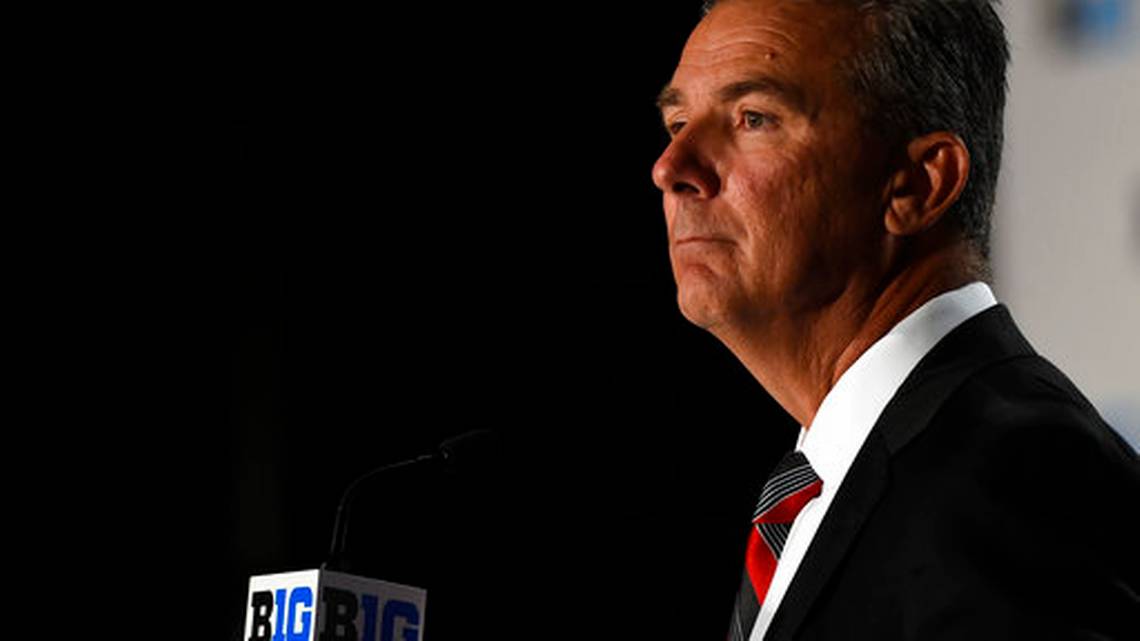
By Nancy Armour |
Urban Meyer preaches a good game about accountability, responsibility and respect for women.
His tolerance of Zach Smith, however, reveals his true character.
The Ohio State football coach told several different stories but had no believable explanation Tuesday for why he’d suddenly fired his longtime receivers coach the night before, hours after Smith’s history of domestic violence allegations surfaced.
What Meyer did know, however, was that he believed the people who told him there was nothing to allegations against Smith in 2015. And that incident back in 2009? Well, it wasn’t what it seemed.
“Domestic issues are a lot of he-said, she-said,” Meyer said.
That’s the same, tired argument people have been using for years to dismiss or excuse domestic violence, endangering women in the process. That Meyer would trot it out as a defense shows that, for all his talk about character and morals, self-preservation is his true guiding force.
It was apparent from his answers Tuesday – or, more accurately, non-answers – that Meyer doesn’t care so much about Smith’s history of domestic abuse allegations as he does the media now making a big deal of them. He cut Smith loose because he didn’t want to deal with the PR nightmare, not because it was the right thing to do.
Meyer acknowledged Tuesday that he’s known all along about Smith’s arrest in 2009, when he was a graduate assistant on Meyer’s Florida staff. According to the police report, Smith grabbed his then-wife and threw her against a bedroom wall. Police at the scene determined Smith “was the primary aggressor,” according to reporter Brett McMurphy, and arrested him.
“It came back to me that what was reported wasn’t actually what happened,” Meyer said.
Yes, because we’ve never heard that before in a domestic violence case.
Smith’s wife eventually decided not to press charges, an all-too-common occurrence in domestic violence cases, and the case was dropped. But from that point on, Meyer was on notice. He and wife Shelley even counseled Smith and his wife.
“(We) wanted to help as we moved forward,” Meyer said.
Did that involve checking in with Smith’s ex-wife to see how they were doing? Did it include continued marital or family counseling when Meyer hired Smith at Ohio State in 2012? Did it include a mandate that Smith report any contacts with police, like the ones in 2015 that McMurphy reported?
According to McMurphy, Smith’s then-wife called police in October of that year and said she’d been the victim of “sustained physical abuse” by her husband. He was arrested the following month for menacing by stalking.
“First I heard about that was last night,” Meyer said. “I asked some people back at the office, ‘What happened?’ And it came back that they know nothing.”
Which is different than what he’d said earlier in the day, when he flat-out said the incident didn’t occur.
“I got a text late last night something happened in 2015. And there was nothing,” Meyer said. “Once again, there’s nothing — once again, I don’t know who creates a story like that.”
And I don’t know who’d dismiss serious abuse allegations so cavalierly, but that’s just me.
Fast forward to May, when Smith was arrested for criminal trespass after dropping his child off at his ex-wife’s apartment rather than a neutral site. Meyer told The Athletic on Tuesday that it was the arrest that led him to re-evaluate Smith’s job.
Which is curious, because Smith was arrested more than two months ago and it was widely covered by the Columbus-area media. Yet not until the other allegations surfaced, raising questions about what Meyer knew and when, was Smith fired.
“The details that I’m obligated to give, I gave,” Meyer said. “You’re talking about people’s lives, etc. … It’s time to move forward.”
That imperialism might work when the subject is his backup quarterback or third-down play calling. But domestic violence can be a matter of life and death, and questions about Meyer’s response to it are going to require more than platitudes for answers.
This article was republished with permission from the original author and 2015 Ronald Reagan Media Award recipient, Nancy Armour, and the original publisher, USA Today. Follow columnist Nancy Armour on Twitter @nrarmour.